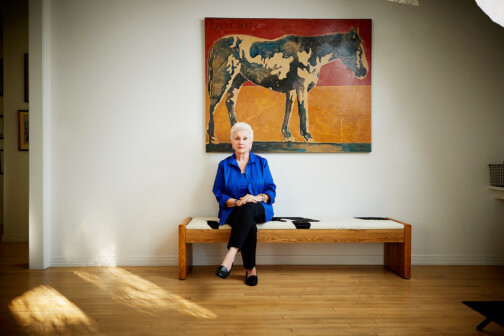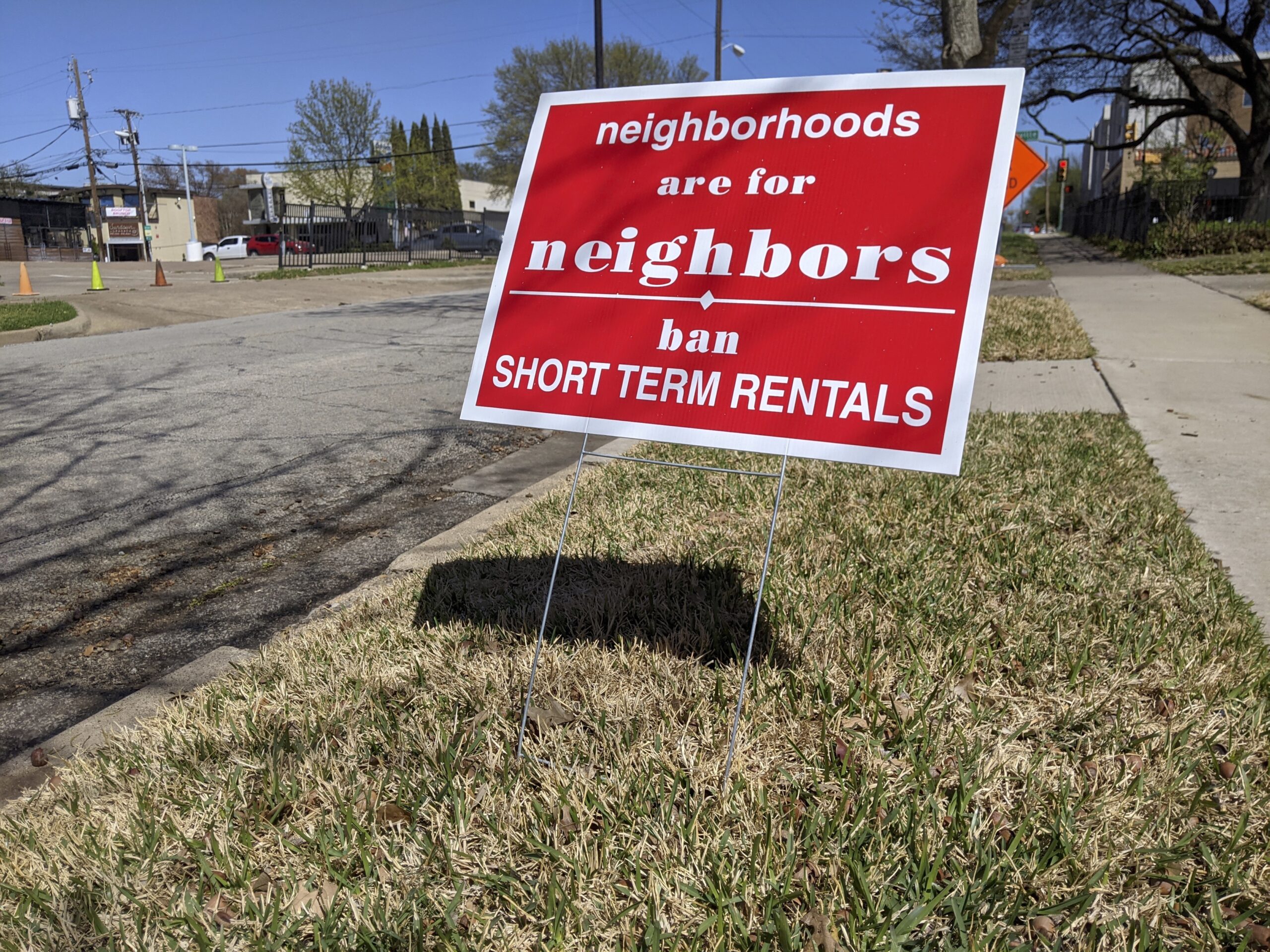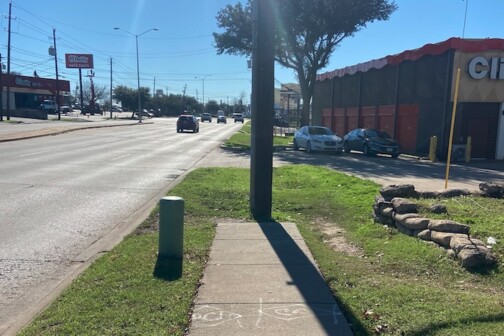Wednesday, the Dallas City Council will be asked to vote on the fate of short-term rentals in Dallas—a long, arduous, contentious process that has been four years in the making.
The Council will consider two options. One would virtually eradicate Airbnb, Vrbo, and other operators from Dallas. The other would allow them to continue operating with new regulations. But before that vote, let’s unpack how we got here, and what the landscape looks like for some of those options.
A year ago last week, city staff presented options for allowing STRs with regulations. Some council members countered with a “Keep It Simple Solution”—KISS—that would zone STRs out of single-family residential neighborhoods, period. The consensus moved to present those options to the city’s Zoning Advisory Commission and the City Plan Commission.
A very vocal group of homeowners has continued to demand a ban. They are joined by some council members, including District 14 Councilman Paul Ridley, who said this spring that he felt the rentals, which are generally rented out for fewer than 30 days at a time, are a lodging use that are illegal to operate in residential zoning. His district has more short-term rentals (689) than any other council district.
“It has created a situation where long-term residents no longer know who lives in houses in their neighborhood,” he said. “It’s affecting the fabric of the neighborhood in a way that is not conducive to safe neighborhoods, frankly.”
Four years ago, the city began talking about what it should do. It started with registration, so that it could begin recouping hotel occupancy taxes from operators. But that was a taxing mechanism, not code enforcement, and the money paid by roughly 1,800 operators goes to the city controller’s office. The city collected $2 million in taxes from STRs over the past seven months, a revenue stream that would vanish under a ban. (There are possibly close to 6,000 operators in Dallas, according to independent tracking sites, showing how much money the city is leaving on the table.)
There are no consequences for not registering. There are no ordinances that directly regulate the short-term rental market in Dallas. The city has not made an effort to regulate beyond applying existing ordinances such as parking or noise limits.
In briefings, city staff has also indicated that a ban would require more money for more code enforcement officers to investigate reported STRs. An ordinance would allow the city to continue to collect those taxes, city staff has said, and raise more money as previously unregistered properties begin paying taxes with the city. The fees generated through a registration process in the ordinance, one city staffer said, would cover the cost of more code officers.
While there has been a vocal lobby for an STR ban, others point to the fact that there are 1,800 or so owners that are abiding by the one small requirement the city has placed on them and are now at risk of losing an extra source of income.
A growing group of residents are out of patience. For them, anything less than a complete shutdown of STRs is not enough. They point to the lack of enforcement and the amount of time it takes for police and code to respond to 911 and 311 calls.

What Is In the Ordinance?
The draft ordinance presented to the Council creates enforcement measures like annual registration, new fees and taxes, occupancy and noise limits, and the requirement that a “local responsible party” would be able to come to the property immediately in the case of an emergency.
City staff studied ordinances in other cities, both in Texas and elsewhere. The city attorney’s office analyzed lawsuits that have already been filed against cities that attempted to regulate or ban STRs, and how courts have ruled. That research also delved into how third-party vendors could help the city manage enforcement.
The city has identified software that can “scrape” and monitor more than a dozen websites for short-term listings. Some offer public-facing dashboards to allow neighbors to see who owns the STR next to them and contact them directly if there is a problem.
Councilman Adam Bazaldua said Monday evening that he planned to propose an amendment to direct city staff to enter into formal agreements with the major platforms that would require those platforms to delist properties that can’t prove that they’re following the city’s rules.
City figures show that 50 percent of the city’s STRS is divided between three Council districts: 1, in North Oak Cliff; 2, in Deep Ellum and the Medical District; and 14, which includes downtown, Uptown, and East Dallas. Councilman Chad West, of District 1, says he is interested in regulation because an outright ban would also impact people who use platforms like Airbnb and Vrbo to generate income that can help them pay down their rising property tax bills.
“I’m concerned about what STRs are doing to our housing stock, and I’m furious at the bad operators for letting bad guests terrorize neighborhoods,” he said. “The easy path is to jump on the proposal offered up by the KISS proponents. It sounds good in social media talking points, but when you scratch below the surface even a little, I believe you’ll see that it’s problematic in terms of enforcement and legality.”
West anticipates asking for a caretaker on site, which his constituents supported in a survey. He would also like a “two strikes and you’re out” policy (the draft ordinance recommends three), adjusting the occupancy to two persons per bedroom plus two guests, requiring operators to maintain insurance, prohibitions on using STRs as event venues, and public updates from staff every six months.

The Worry and the Warning
There have been a few STR suits in the past few years, and the results are a bit of a mixed bag. In 2022, the Fifth Circuit struck down a New Orleans ordinance that required STR operators to live in Louisiana. The opinion also suggested that cities could impose a cap on how many STRs one operator can own.
The Third Court of Appeals ruled in 2019 that Austin’s prohibition of new full-time STRs in residential neighborhoods was unconstitutional. Arlington’s ordinance that restricts STRs to specific areas has been upheld in appellate court.
Courts have sometimes agreed that STRs are commercial like ban supporters say, but they’ve also realized that states are taxing those properties as if they’re residential.
By and large, however, cities are passing ordinances that regulate STRs in some way, versus outright bans. Airbnb and Vrbo listings show property owners are still operating in cities that have banned them, like Fort Worth.
Dallas is also playing with fire. State legislation could put the city back at square one if the Council votes for the ban. In the most recent legislative session, House Bill 2665, authored by state Rep. Gary Gates (R-Richmond), would have prohibited cities from creating policies that banned short-term rentals.
It was modified to create a task force to study STR ordinances but ultimately didn’t make it to Gov. Abbott’s desk. On Monday, Gates said that a ban would be like waving a red flag in front of him.
“If you think you’re gonna prevail on an outright ban, you’re gonna lose,” he said. “It may not be that this past session, it may not be the next session, but you just can’t have an outright ban.”
Frustrated by the bill’s lack of progress this session, Gates says he has requested that House Speaker Dade Phelan authorize an interim study to look at STR ordinances.
If Dallas passes a ban, he all but promised that the city will be featured front and center in that study.
Gates said he was in favor of regulation and hoped that cities that opt to take that route would consult with him. He said he had no problem with provisions similar to what Dallas’ draft ordinance proposes. He’s even open to revoking the registration of property owners who are repeatedly cited for infractions.
“No one is saying you can’t regulate,” he said. “I understand that you have a very vocal group of people wanting the ban, but I also received hundreds of emails across the state of Texas with pictures and stories about how this is the only way people could keep, say, a vacation rental home was that they bought one somewhere and rent it out part-time, which is a way the middle class can afford to own a vacation rental. Or people that have made it a family business. What gets lost in this debate is the vast majority of people are doing it for the right reason.”
Missed Opportunities
Even as early as 2017, some residents had begun asking members of the Dallas City Council to consider some kind of regulation.
“It’s tricky—people have asked us to implement some regulations around short-term rentals like Airbnb, but so far, we haven’t,” then-Councilman Philip Kingston, who represented District 14, said then. “On the Council, there is a pretty solid majority that wants to treat things like this, Uber, and Lyft as kind of an experiment. On the whole, Airbnb and Vrbo have been good neighbors — they help sell houses and help people develop easy income streams.”
Obviously, minds and circumstances (and the composition of the City Council) can change. But in 2017, several cities (including South Padre Island) had already enacted ordinances that provided guardrails for a concept that was only going to continue to grow in popularity. The homeowner sentiment in Dallas was clearly a request for rules and enforcement.
Would we still be having this four-year-old conversation if, back in 2017, enforcement was put in place? We’ll never know. But given those cities who were early adopters of regulations seem to have done so with very little controversy, it’s worth considering that the conversation might be different now if Dallas had joined them.
Get the D Brief Newsletter
Author





